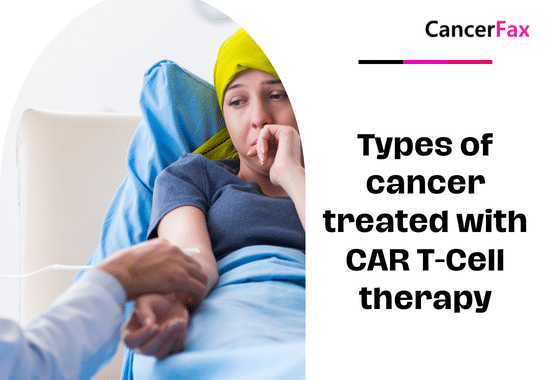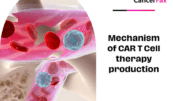Types of cancer treated with CAR T-Cell therapy
Introduction
CAR T cell therapy has really taken off in harnessing the immune system to specifically destroy cancerous cells. After showing tremendous success at first in the treatment of hematologic malignancies, CAR T cell therapy is being extended today to a range of cancers, including solid tumors. This article will discuss different types of cancers treated with CAR T cell therapy, pointing out successes, ongoing research, and future potential.
Hematologic Malignancies
B-cell Acute Lymphoblastic Leukemia (B-ALL):
Success Stories and Clinical Trials: Among all blood cancers, CAR T cell therapy has proven most effective for the treatment of B-ALL, notably in children. Several clinical trials, some using Kymriah, have shown that this CAR T cell therapy induced high remission rates in patients with either relapsed or treatment-refractory disease.
Target: The gene therapy targets the CD19 antigen on the B-cell surface. Engineered CAR T cells specifically target CD19 and eliminate normal and malignant B cells.
Challenges:
Despite high remission rates after treatment, there are still issues of relapse due to the so-called antigen escape, wherein the cancer cells shed the CD19 marker.
Diffuse Large B-Cell Lymphoma (DLBCL)
Clinical Trials and Success Stories: CAR T cell therapeutics, such as Yescarta (axicabtagene ciloleucel), have been approved to treat DLBCL. They have shown immense success in those patients who have failed other standard treatments.
Mechanism: In the same manner as B-ALL, the on-target CD19 antigen on B cells is targeted to destroy the said cancerous cells.
Challenges: The management of side effects, especially CRS and neurotoxicity, is important for the safety of the patient.
Multiple Myeloma:
Success Stories and Clinical Trials: CAR T cell therapy is being expanded to multiple myeloma targeting antigens such as BCMA. Early clinical trials, including ide-cel, have returned promising results.
Mechanism: The treatment targets BCMA, highly expressed on multiple myeloma cells, ensuring their destruction.
Challenges: Long-term efficacy and strategies to manage relapse through antigen escape are active areas of research.
Solid Tumors

Glioblastoma:
Current Research: Glioblastoma is a very aggressive brain tumor; this makes for an environment less than ideal for CAR T cell therapy due to the special features of the brain and heterogeneity of the tumor.
Mechanism: Target antigens are, for example, EGFRvIII expressed on glioblastoma cells.
Challenges: One would consider inhibiting factors such as the blood-brain barrier, immune evasion of the tumor cells, and on-target off-tumor toxicity.
Pancreatic Cancer:
Current Research: CAR T cell therapy has proved difficult for pancreatic cancer because of its high stromal density and profoundly immunosuppressive microenvironment.
Mechanism: Various targets are currently under investigation, including mesothelin and CEA.
Challenges: Currently, how to enhance the infiltration and activity of CAR T cells within the TME is one of the main directions of research.
Ovarian Cancer:
Current Research: CAR T cell therapy for ovarian cancer targets antigens such as mesothelin and folate receptor alpha.
Mechanisms: Such therapies would specifically kill ovarian cancer cells that express these antigens.
Challenges: Key challenges in this area are how to overcome the immunosuppressive TME and ensure CAR T-cell persistence.
Lung Cancer:
Current Research: CAR T-cell therapy is being extended to lung cancer, including NSCLC, where targets include the antigens EGFR and HER2.
Mechanism: The therapy attacks these antigens, killing off the cancer cells carrying them.
Challenges: It faces problems similar to those with any other solid tumor in dealing with antigen heterogeneity, the immunosuppressive microenvironment, and so on.
Ongoing Research and Future Directions
Novel Antigen Targets:
Researchers are continuing to find newer antigens to which CAR T cells can be targeted. These range from tumor-associated antigens to tumor-specific antigens.
Combination Therapies:
CAR T cell therapy can be combined with other treatments such as checkpoint inhibitors, chemotherapy, and radiation to increase its efficacy and engender resistance.
Next-Generation CARs:
Improved designs in CARs include dual-targeting CARs, while the “armored” CAR T cells secrete cytokines aimed at improving their functionality and lowering relapse rates.
Overcoming the Tumor Microenvironment:
Using oncolytic viruses or drugs to get rid of immune suppressive cells to improve the function of CAR T cells in solid tumors are some of the ways that the TME has been changed.
Conclusion
The use of CAR T cell therapy has been very promising for the treatment of numerous cancers, hematologic malignancies included. Although problems still arise, continuing research and new strategies give way to expanded possibilities of its application for the treatment of more cancer types, including STs.
Given the new technological developments and deeper understanding of cancer biology, the future is bright for CAR T cell therapy. In a rapidly developing field, CAR T cell therapy has been one source of hope during the lifetime of patients suffering from cancer, demonstrating a potential to deliver long-lasting remissions and improved quality of life.
Susan Hau is a distinguished researcher in the field of cancer cell therapy, with a particular focus on T cell-based approaches and cancer vaccines. Her work spans several innovative treatment modalities, including CAR T-cell therapy, TIL (Tumor-Infiltrating Lymphocyte) therapy, and NK (Natural Killer) cell therapy.
Hau's expertise lies in cancer cell biology, where she has made significant contributions to understanding the complex interactions between immune cells and tumors.
Her research aims to enhance the efficacy of immunotherapies by manipulating the tumor microenvironment and exploring novel ways to activate and direct immune responses against cancer cells.
Throughout her career, Hau has collaborated with leading professors and researchers in the field of cancer treatment, both in the United States and China.
These international experiences have broadened her perspective and contributed to her innovative approach to cancer therapy development.
Hau's work is particularly focused on addressing the challenges of treating advanced and metastatic cancers. She has been involved in clinical trials evaluating the safety and efficacy of various immunotherapy approaches, including the promising Gamma Delta T cell therapy.
- Comments Closed
- August 1st, 2024






Blood cancer immunotherapy, CAR-T cell therapy cancers, CAR-T treatable cancers, FDA-approved CAR-T indications, Leukemia CAR-T treatment, Lymphoma CAR-T therapy, Multiple myeloma CAR-T, Solid tumor CAR-T research
CancerFax is the most trusted online platform dedicated to connecting individuals facing advanced-stage cancer with groundbreaking cell therapies.
Send your medical reports and get a free analysis.
🌟 Join us in the fight against cancer! 🌟
Привет,
CancerFax — это самая надежная онлайн-платформа, призванная предоставить людям, столкнувшимся с раком на поздних стадиях, доступ к революционным клеточным методам лечения.
Отправьте свои медицинские заключения и получите бесплатный анализ.
🌟 Присоединяйтесь к нам в борьбе с раком! 🌟